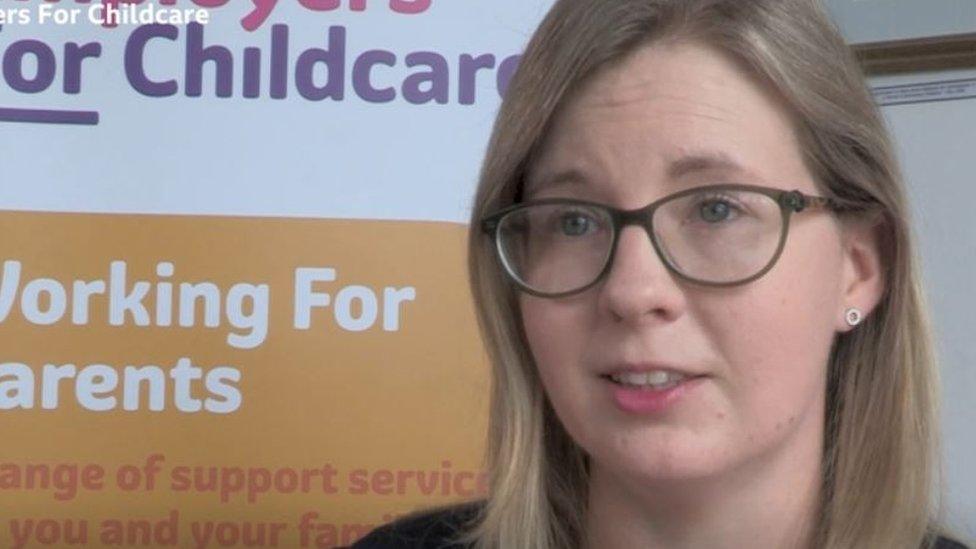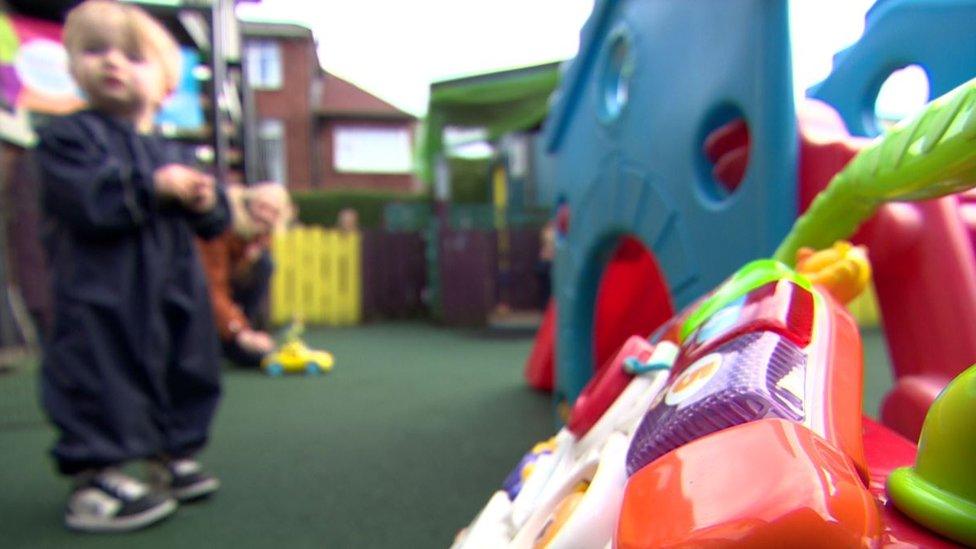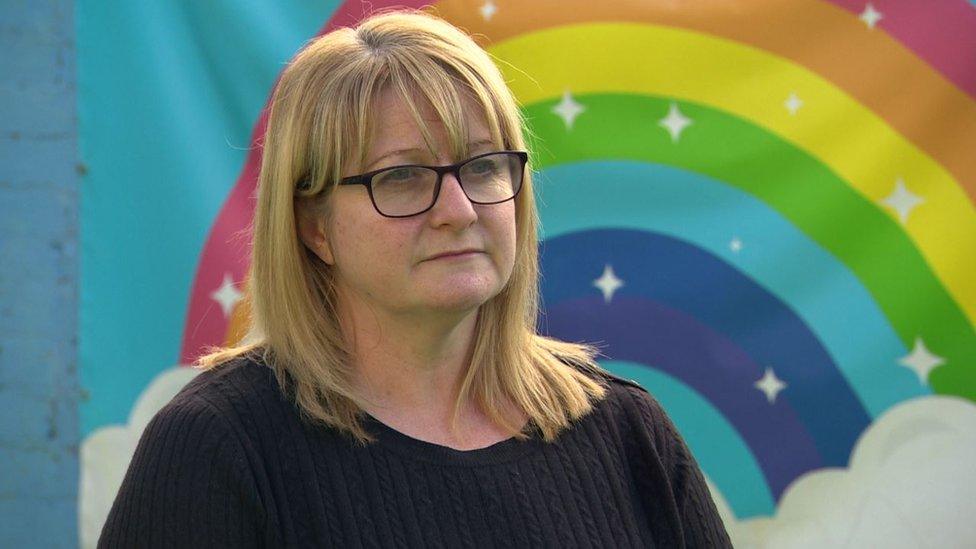Childcare: One in three NI providers 'plans to raise prices'
- Published
- comments

One in three childcare providers in Northern Ireland is planning to put up prices as they struggle with rising costs, a survey has suggested.
The survey was carried out by social enterprise Employers For Childcare and received more than 2,200 responses from parents and childcare providers.
It found almost a third of childcare providers described their current financial position as "distressed".
Some said that they were facing immediate risk of closure.
At the same time, about a quarter of families - 28% - said they were struggling to find and pay for the childcare they need.
'Worrying picture'
The research suggested the average cost of a full-time childcare place in Northern Ireland was £170 per week - the equivalent of 34% of the median weekly household income in Northern Ireland.
Aoife Hamilton, the enterprise's head of charity services, said: "Childcare providers are facing unprecedented challenges - in recruiting and retaining staff and meeting salaries, particularly with the increase announced to the National Living Wage, as well as rising food and energy costs and uncertainty over numbers and occupancy levels.
"We have been reporting on childcare in Northern Ireland for over a decade and for many years, parents and childcare providers have been telling us about the issues they face, but this is the most worrying picture yet."

Aoife Hamilton said they were hearing that this was the "most worrying picture yet"
The affect of Covid-19 on the sector means one in two parents (51%) who took part in the survey said the pandemic had changed their childcare requirements.
In 2021, families reported using an average of 39 hours of childcare per week, down from 42 hours in 2020.
'I don't work for the money'
Alicia Lappin is among the working parents who are concerned about rising childcare costs.
The mother of four from Portadown, County Armagh, would like to return to work full time, but said "the cost of childcare doesn't allow me to do it".
"Year on year, it seems that my pay packet goes up pennies but the childcare seems to go up pounds... every single year it's a bit more," she told the BBC's Good Morning Ulster programme.
"It's got to the stage where I've had to make my hours part time in order to be able to cover the cost of childcare - it doesn't financially pay me to be there full time."
Her children are aged nine, seven, four and 15 months. With the eldest three in school or nursery, she currently pays for day care for her youngest child.
She pays about £75 for him for 15 hours a week while she is at work.
The centre is run by a social enterprise and Ms Lappin admits it is "relatively cheap compared to what other people are paying" but the bill is still a "huge proportion" of her part-time wage.
By the time she factors in other work-related outgoings such as fuel costs, parking and tax, there is very little left.
"I don't work for the money at the minute. I'm working because I want my foot in the door, I don't want to lose my position and I'm working because I love what I do," she said.
'Cost of our business has never been higher'
Speaking on the same programme, childcare provider Diane Koplewsky said her industry was facing rising costs and currently has no choice but to pass them on to customers.
She is the co-owner of the Sleepy Hollow Group which is one of Northern Ireland's biggest childcare companies, operating across 18 locations.
"As household costs increase, so do business costs," she said.
"Our PPE, cleaning, hygiene costs have all increased and ironically, so has our insurance even though insurers didn't pay out when we had to close.
"So the cost of operating a childcare business has never been higher."

Childcare provider Diane Koplewsky says she has no choice but to increase costs
Ms Koplewsky called for more government support for her industry so that childcare costs are no longer a barrier to employment for parents.
"Childcare needs to be valued as essential element of the economic infrastructure and we need to fund it as such," she said.
"We aren't seeing any level of investment in childcare here - working parents deserve it, childcare providers deserve it and so do our workforce.
"Our workforce need to be valued for their role in care, we need to be valued as early educators."
Ms Koplewsky said childcare providers "do not want to increase fees" because they know the challenges facing working parents.
However, she said their only source of income at the moment is parents' fees and these may have to rise if there is no government investment.
"Nobody wants to increase costs but what else are we to do if we don't get funding from the executive?"
'Second mortgage'
Maria McDonagh who owns Adventures Day Nursery in west Belfast said she has been left with no other choice but to increase fees.
She said: "For us to be able to remain in business, we are probably looking at up to a 15% increase - 10% should cover wage increases and increases in the cost of providing food and activities and resources, but the energy costs will be the remaining hike that we have to look at this year."

Maria McDonagh says the price hike will cover wage increases, as well as the increased costs of food, energy and equipment.
Dad-of-two Liam Mahaffy saw his childcare provider close its doors last month.
He said: "It's very sad for my son, the friends he had made there, they are all going to separate places now so it will be hard to maintain those friendships. It is very upsetting for the staff, they were absolutely brilliant the whole time."

Liam Mahaffy says childcare bills could become like a third mortgage when his second child starts going next year
His partner is currently on maternity leave so while their current bill is significant, it is likely to increase next year.
He said: "It literally is, for us, a second mortgage, and that's just for three days a week. In another seven months' time, there will be a second one going into childcare so hopefully that's not a third mortgage.
"When my partner goes back after maternity leave, she might have to reduce her hours. I will be looking after them two days a week. It definitely does impact more, unfortunately, on women's employment prospects."
Related topics
- Published3 October 2018

- Published4 June 2020

- Published31 May 2020

- Published10 April 2020
